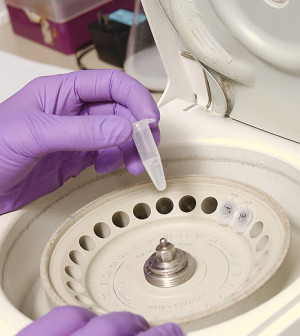- 10 Strategies to Overcome Insomnia
- Could Artificial Sweeteners Be Aging the Brain Faster?
- Techniques for Soothing Your Nervous System
- Does the Water in Your House Smell Funny? Here’s Why
- Can a Daily Dose of Apple Cider Vinegar Actually Aid Weight Loss?
- 6 Health Beverages That Can Actually Spike Your Blood Sugar
- Treatment Options for Social Anxiety Disorder
- Understanding the Connection Between Anxiety and Depression
- How Daily Prunes Can Influence Cholesterol and Inflammation
- When to Take B12 for Better Absorption and Energy
Personalized ‘Pills’ From a 3D Printer?

With 3D printing, the concept of personalized medicine could take on a new dimension, researchers report.
Mass-produced drugs can’t take into account specific patient characteristics such as race, weight, and kidney and liver functions. Customized medications, on the other hand, might be more effective and less likely to cause side effects, the researchers said.
For this study, investigators from Wake Forest University, Columbia University and the University of North Carolina created a prototype computer algorithm featuring software for 3D printing of personalized medications. After receiving details about a patient’s specific medical and biological characteristics, the software determines personalized doses and provides data for 3D printing of medications.
Five doses of 80 “pills” — ranging from 124 to 373 milligrams — were created through 3D printing, with little variability, the researchers said.
The findings show that using 3D printing to create customized medications is possible. But, further research is needed before this technology might become available for patients, said Dr. Min Pu, of Wake Forest University School of Medicine, and colleagues in an American Heart Association news release.
The study was to be presented Monday at the American Heart Association’s annual meeting in Orlando, Fla. Data and conclusions presented at meetings should be considered preliminary until published in a peer-reviewed medical journal.
More information
The U.S. National Institutes of Health has more about personalized medicine.
There’s more on heart attack prevention at the U.S. National Heart, Lung, and Blood Institute.
Source: HealthDay
Copyright © 2026 HealthDay. All rights reserved.










